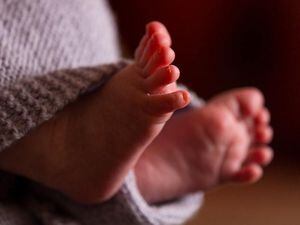Record number of babies delivered by c-section
Record numbers of babies were delivered through caesareans across the Black Country and Staffordshire last year, official Government figures show.

Office for Health Improvement and Disparities data showed 2,193 babies were born in 2020/2021 through c-section – around a third of the 6,625 delivered during the year.
Each area recorded their highest rates for c-sections since records began in 2014/2015 as NHS chiefs decided to scrap corresponding performance targets.
In Wolverhampton, 995 births were recorded with 337 babies, 33.9 per cent, being born by c-section. The figure was up from 31 per cent the year before.
In Dudley, 380 (34.2 per cent) of 1,100 babies were born via caesarean, up from 33 per cent in 2019/20.
In Staffordshire, there were 2,535 births. Of those, 854 babies (33.7 per cent), were delivered through c-section. This was up from 30.9 per cent the year before.
Of the 745 babies born in Walsall, 230 - 30.9 per cent - were via caesarean, up from 29.6 per cent in 2019/20, while 392 out of 1,240 births (31.6 per cent) recorded in Sandwell were c-sections, up from 30.2 per cent previously.
A recent review of failings at the Shrewsbury and Telford Hospital NHS Trust – which is the main provider of services for Telford and Wrekin and Shropshire – found some mothers were made to have natural births when they should have been offered a caesarean.
The review found that around 200 babies and nine mothers could have survived if it had provided better care while the trust aimed to preserve its low caesarean rate.
Following the Government's recommendation, NHS England told all maternity services to stop using total caesarean section rates as a means of performance management earlier this year.
The Royal College of Obstetricians and Gynaecologists said it welcomed the decision from NHS England, as caesarean birth targets are "not appropriate in individual circumstances".
Dr Teresa Kelly, consultant obstetrician and spokesperson for RCOG, said the national increase is due to a higher number of complex births – partly caused by the rises in both obesity rates and the average age of women giving birth.
Dr Kelly said: “Childbirth is unpredictable and complications can and do arise. The safety and care of women during labour and birth and the safe arrival of their babies should always be the main focus, and medical intervention in some cases can be lifesaving."
The Royal College of Midwives said it is important women have personalised care, and a pregnancy and birth that is right for them.
Birte Harlev-Lam, executive director at RCM, added: “Decisions about clinical care should not be dictated by targets and should be made in the best interests of the woman and her baby, in collaboration with the woman."





